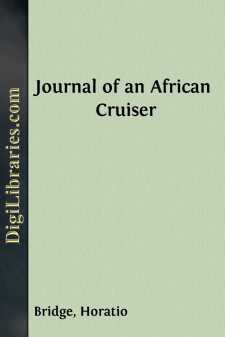Categories
- Antiques & Collectibles 13
- Architecture 36
- Art 48
- Bibles 22
- Biography & Autobiography 813
- Body, Mind & Spirit 142
- Business & Economics 28
- Children's Books 14
- Children's Fiction 11
- Computers 4
- Cooking 94
- Crafts & Hobbies 4
- Drama 346
- Education 46
- Family & Relationships 57
- Fiction 11829
- Games 19
- Gardening 17
- Health & Fitness 34
- History 1377
- House & Home 1
- Humor 147
- Juvenile Fiction 1873
- Juvenile Nonfiction 202
- Language Arts & Disciplines 88
- Law 16
- Literary Collections 686
- Literary Criticism 179
- Mathematics 13
- Medical 41
- Music 40
- Nature 179
- Non-Classifiable 1768
- Performing Arts 7
- Periodicals 1453
- Philosophy 64
- Photography 2
- Poetry 896
- Political Science 203
- Psychology 42
- Reference 154
- Religion 513
- Science 126
- Self-Help 84
- Social Science 81
- Sports & Recreation 34
- Study Aids 3
- Technology & Engineering 59
- Transportation 23
- Travel 463
- True Crime 29
Journal of an African Cruiser
by: Horatio Bridge
Description:
Excerpt
PREFACE.
The following pages have afforded occupation for many hours, which might else have been wasted in idle amusements, or embittered by still idler regrets at the destiny which carried the writer to a region so little seductive as Africa, and kept him there so long. He now offers them to the public, after some labor bestowed in correction and amendment, but retaining their original form, that of a daily Journal, which better suited his lack of literary practice and constructive skill, and was in fitter keeping with the humble pretensions of the work, than a re-arrangement on artistic principles. At various points of the narrative, however, he has introduced observations or disquisitions from two or three common-place books, which he kept simultaneously with the Journal; and thus, in a few instances, remarks are inserted as having been made early in the cruise, while, in reality, they were perhaps the ultimate result of his reflection and judgment upon the topics discussed.
If, in any portion of the book, the author may hope to engage the attention of the public, it will probably be in those pages which treat of Liberia. The value of his evidence, as to the condition and prospects of that colony, must depend, not upon any singular acuteness of observation or depth of reflection, but upon his freedom from partizan bias, and his consequent ability to perceive a certain degree of truth, and inclination to express it frankly. A northern man, but not unacquainted with the slave institutions of our own and other countries—neither an Abolitionist nor a Colonizationist—without prejudice, as without prepossession—he felt himself thus far qualified to examine the great enterprise which he beheld in progress. He enjoyed, moreover, the advantage of comparing Liberia, as he now saw it, with a personal observation of its condition three years before, and could therefore mark its onward or retreating footsteps, and the better judge what was permanent, and what merely temporary or accidental. With these qualifications, he may at least hope to have spoken so much of truth as entirely to gratify neither the friends nor enemies of this interesting colony.
The West Coast of Africa is a fresher field for the scribbling tourist, than most other parts of the world. Few visit it, unless driven by stern necessity; and still fewer are disposed to struggle against the enervating influence of the climate, and keep up even so much of intellectual activity as may suffice to fill a diurnal page of Journal or Commonplace Book. In his descriptions of the settlements of the various nations of Europe, along that coast, and of the native tribes, and their trade and intercourse with the whites, the writer indulges the idea that he may add a trifle to the general information of the public. He puts forth his work, however, with no higher claims than as a collection of desultory sketches, in which he felt himself nowise bound to tell all that it might be desirable to know, but only to be accurate in what he does tell....


